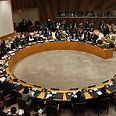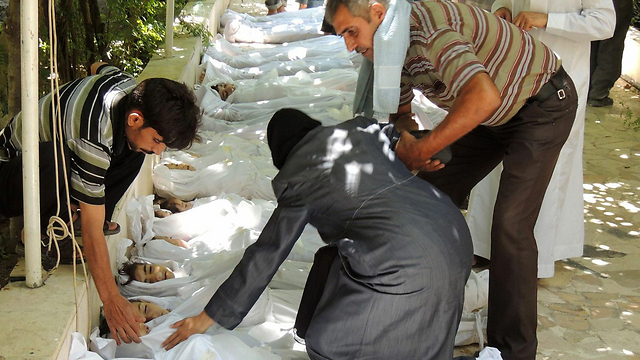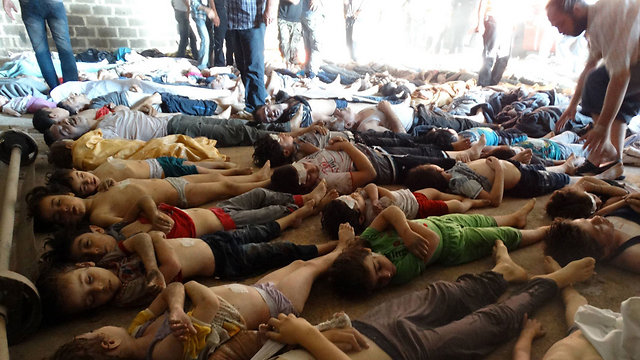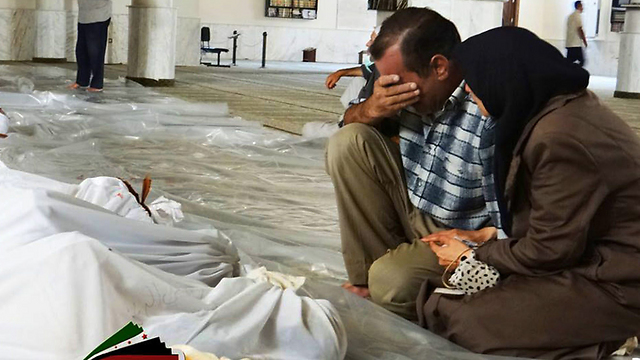
Russia, China prevent official UN probe of Syria
Western-drafted statement calling for UN on-site investigation into reports of poison gas attack in Damascus watered down by Security Council to accommodate objections from Moscow, Beijing
Syria's opposition accused government forces of gassing hundreds of people on Wednesday by firing rockets that released deadly fumes over rebel-held Damascus suburbs, killing men, women and children as they slept.
With the death toll estimated between 500 and 1,300, what would be the world's most lethal chemical weapons attack since the 1980s prompted an emergency meeting of the UN Security Council in New York.
Related stories:
- Syrians retrieve 'sleeping' dead after alleged gas attack
- Opposition says 1,300 killed in gas attack
- UN chemical weapons experts arrive in Syria
The council did not explicitly demand a UN investigation of the incident, although it said "clarity" was needed and welcomed UN chief Ban Ki-moon's calls for a prompt investigation by the UN inspection team in Syria, led by Ake Sellstrom.
An earlier Western-drafted statement submitted to the council, seen by Reuters, was not approved. The final version of the statement was watered down to accommodate objections from Russia and China, diplomats said. Moscow and Beijing have vetoed previous Western efforts to impose UN penalties on Assad.
Meanwhile, it was reported that President Bashar Assad's forces bombarded rebel-held suburbs of Damascus on Thursday, activists said.
Rockets fired from multiple launchers and heavy mortar rounds hit the eastern neighborhoods of Jobar and Zamalka, among areas on the eastern outskirts of the capital affected by chemical weapons attack that killed between 500 and 1,300 people on Wednesday, they said. The nearby district of Qaboun to the north and the Yarmouk Palestinian refugee camp area to the south were also hit, the activists added.
Syrian Information Minister Omran Zoabi said the allegations were "illogical and fabricated". President Bashar Assad's officials have said they would never use poison gas against Syrians. The United States and European allies believe Assad's forces have used small amounts of sarin before, hence the current UN visit.
Immediate international action is likely to be limited, with the divisions among major powers that have crippled efforts to quell 2 1/2 years of civil war still much in evidence.
Russia backed up Syrian government denials by saying it looked like a rebel "provocation" to discredit Assad.
Britain voiced the opposite view: "I hope this will wake up some who have supported the Assad regime to realize its murderous and barbaric nature," Foreign Secretary William Hague said on a visit to Paris.
France, Britain, the United States and others called for an immediate on-site investigation by UN chemical weapons inspectors who arrived in the Syrian capital only this week. Moscow, urging an "objective" inquiry, said the very presence of that team suggested government forces were not to blame.
US President Barack Obama has made the use of chemical weapons by Assad's forces a "red line" that in June triggered more US aid to the rebels. But previous, smaller and disputed cases of their deployment have not brought the all-out military intervention rebel leaders have sought to break a stalemate.

US Senator John McCain, a Republican critic of Obama's Syria policy, said on Twitter that failure to penalize previous gas attacks had emboldened Assad: "No consequence for Assad using chemical weapons & crossing red line," he said. "We shouldn't be surprised he's using them again."
Images, including some by freelance photographers supplied to Reuters, showed scores of bodies - some of them small children - laid on the floor of a clinic with no visible signs of injury. Some showed people with foam around their mouths.
The United States and others said it had no independent confirmation that chemical weapons had been used. The UN chief, Ban, said the head of the inspection team in Damascus was already discussing the latest claims with the government.
Opposition activists cited death tolls ranging from about 500 to - by one account - some 1,300 after shells and rockets fell around 3 am (0000 GMT) on Wednesday. In 1988, 3,000 to 5,000 Iraqi Kurds were gassed by Saddam Hussein's forces at Halabja.
- Receive Ynetnews updates directly to your desktop













